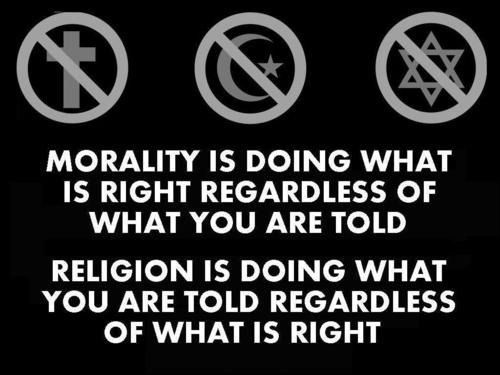“Sincerely Held Religious Beliefs” – A Specious Defence of Prejudice

Were Religions Invented to Control Fear of the Other?
Witnessing what is happening in the world – how angry, defensive, and fearful people are of “the other” – I have to wonder, did any form of ego-based prejudice exist against another person’s sexual or romantic expression before religions existed?
Consider the latest news out of Texas:
“The Texas Senate on Tuesday gave its initial OK to a bill that civil rights advocates say would give state-licensed workers — including doctors, child care providers and counselors — a free pass to discriminate, especially against people in the LGBTQ community. Senate Bill 17, filed by state Senator Charles Perry, R-Lubbock, would bar state agencies that issue occupational licenses from penalizing workers who refuse to provide services based on “a sincerely held religious belief.”” (Source)
How is it possible for “a sincerely held religious belief” to be used as an acceptable form of discrimination? The answer is simple. There are far too many powerful egos in power pandering to far too many fearful egos who scream the loudest and also throw the largest amount of cash and support behind any politician who helps them get their way.
To create a framework in order to address the core question, “Were religions invented to control the ego”, and to show how most religions are dangerous for society, let’s define the various meanings for both ego and religion.
The “ego” defined:
- A person's sense of self-esteem or self-importance.
- In psychoanalysis, the part of the mind that mediates between the conscious and the unconscious and is responsible for reality testing and a sense of personal identity. (Source)
Religion defined:
- The belief in and worship of a superhuman controlling power, especially a personal God or gods. (Source)
The above definition of religion is incorrect. Religion is not a “belief” in and of itself. Religion is a system of teaching and ideologies organized by an individual or a group of people. Each religion espouses a particular “belief” and type of worship. The more fundamentalist a particular religion, the more dogmatic the “…set of principles laid down by an authority as incontrovertibly true” (Source). The more dogmatic a religion, the more that the role of ego plays into the rigid, binary-based belief systems like right versus wrong; man or woman; good versus evil; straight versus “the other”; religion versus science, and so on.
Hello Ego My Old Friend…
When we are relaxed and comfortable with who we are, we are open to new experiences and people, and understanding of different values and opinions. When we are tense, upset, fearful, or angry, the ego flares up to protect and deflect us from everything external.
A fragile ego seeks to control, to possess, and fight for its existence. The ego alone can take care of itself, but when a single ego needs to coexist in a group of people, a tribe, a society, how can everyone function without chaos or anarchy? I wonder if religions became the simplest solution to manage and provide rules for multiple egos vying for attention and control.
Religion Makes Spiritual Practice Easy – But not Necessarily Authentic
Practicing meditation as a method to understand the nature of consciousness and how to coexist with other beings on this planet requires grace, dedication, openness, and a willingness to bear witness to one’s one truth; to one’s own ego, however fragile, defensive, or well managed it may be.
The results of meditation are not immediate. It is a solo practice that takes time the acceptance that progress is subtle and qualitative. The ego-mind will do its best to play tricks, like telling you it's fine to take a day off, or that you don't need the practice anymore. Going within is private and personal practice. The ego will try and convince you that doing this alone is a lonely thing - "Wouldn't it be more fun to join a group and have someone else tell you what to do?", says a soothing voice in your head.
Surely following a system, reciting chants and prayers, following rules that project an attainable outcome (salvation through dedication to the "one true path") is so much easier for the monkey-mind to latch onto than trusting one's own consciousness.
Religion Alleviates the Need for Patience and Tolerance.
Follow the rules, become born again, and you will be saved for eternity. “I’ve done my penance. Look at all those heathens suffering needlessly. I feel so sorry for them, knowing that I will be pitying them burning in the fires of damnation, while I am comfortable resting in heaven with the saved.”
“Look how good I am going to church and following the rules” – something I used to think when I was young and piously Catholic. But are you only mouthing the words, the hymns and the prayers, believing those “sacred words” will save you? Repetition of words without experiential knowing doesn't lift the veil of ignorance or engender spiritual awareness.
Going into the darkness of your consciousness and being responsible and responsive to the inner light of your humanity and connection with the universe is what will truly “save you”. And by save, I mean, you will wake up within the limitless nature of your own consciousness, not someone else’s limited and dogmatic construct in the form of religion.

Religion supports tribalism and it's human nature to band together for social security and safety. The ancient religions supported the base needs of human nature at a time when life was truly difficult and severe.
In this modern world, ancient religions show their weakness in the form of superstition, especially in light of what we know from science and the technologies we have created that alleviate the problems many religions attempted to once solve.
For tribalism to work, it needs a leader, thus the anthropomorphizing of the understanding and concept of “god” into a person. And every deity or god was given human characteristics, both good and bad. For example, Zeus was a power-hungry womanizer who would deceive, rape, and punish his own children (other gods) to get his way. The god of the Old Testament would punish, flood, and force people to sacrifice their own children to demonstrate their allegiance.
Believing in a Higher Power Represented as a Being Creates Ethical Quandaries
Those who believe in a god or gods as described above, or something similar, are creating fictions based on the problematic manifestations of their own unchecked egos. The belief in imaginary beings is a questionable moral jump to circumvent taking responsibility for one's own actions, leading from a place based solely on mirroring humanity at its worst.
How often have you heard or read, "believe in god and you will be saved, healed, find love", and so on? Today we have modern medicine, social systems, and dating apps. While the answers to all of our questions and problems, and “how to save the world”, will not be found in the religions of old, or the individual modern technologies and sciences, bearing witness to the nature of our individual consciousness on a mass scale will connect more of us that the internet ever has.
We Can Find Truth in Our Own Darkness
Today, we have the power and freedom to express ourselves, to learn more, to understand what once seemed mysterious, to revel in and laugh at our past ignorance. To deny what is obvious and right in front of us, that which can be easily proved (e.g. the earth is round; the earth was not created 5,000 years ago by an egotistical, maniacal god who placed dinosaur bones in the earth to trick humans) is not only sophistry, it’s a display of willful ignorance bordering on intellectual impediment.
We are no longer living in the dark ages of superstition. Holding onto ancient narratives of a vengeful god continues to feed the needs of weak egos to be right (power hungry; saved) and in control (tribalism; status quo). We don’t need god or a religion to be spiritual. We only need to look within ourselves to study the nature of consciousness and discover that we are all connected.
History has documented countless wars and crusades over millennia because of "sincerely held religious beliefs". Translation: if you don't believe my dogma, you're dog meat.
Expand your consciousness – more about the ego:
- Being At Ease With Yourself – LOP067
- Your Relationship with Your Mind (the Ego) and the Other
- Fear of “The Other” is Defence of the Ego – LOP059
- There Is No Space Between Us In The Gap – LOP053
- Ram Dass – Here and Now – Ep. 141 – Practice Makes Perfect
Originally published on Th-Ink Queerly. Cover image: Dave MacFarlane





Member discussion